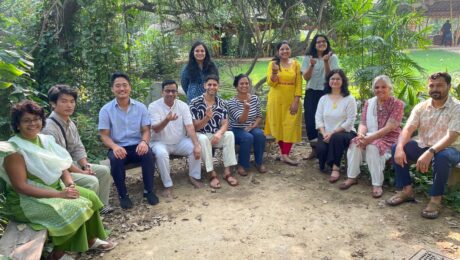South-East Asia Regional Assembly of the ICCA Consortium, April, 2025
Making an impact at the regional level through their presentations in the South-East Asia
Regional Assembly of the ICCA Consortium (21-26 April, 2025), held in Lombok, Indonesia,
Watikala Phom from Lemsachenlok and Pentile, member of Sendenyu Community Biodiversity and Wildlife Conservation Board share their communities’ experiences in conserving their forests. A report detailing this can be read here.
- Published in Latest Post
Community Conserved Areas – National Working Group Meet, May 2025
A National Working Group on Community Conserved Areas (CCAs) was held in Delhi on 9-10
May 2025 to deliberate a roadmap for a comprehensive policy for CCAs in India. Thirteen
individuals from across India participated. These included community representatives and
advocacy group members. Strategic actions for supporting CCAs at the national level through
existing policies, were discussed. A clear structure for the group was given, assigning work
for sub-groups and fixing various coordination responsibilities.
- Published in Latest Post
National Level Workshop on Protected Areas and Women, April, 2025 at Hyderabad
Kalpavriksh, represented by Ishika Patodi and Neha Negi, participated in a National Level
Workshop on Protected Areas and Women, on 24th-25th April, 2025, at Hyderabad. The
workshop is organised by MAKAAM, Dhaatri Trust, Keystone Foundation, and Centre for
People’s Forestry. The consultation will mainly have Adivasi and other traditional forest-
dwelling women from protected areas in different states, both from areas which have been
relocated/affected and from new project sites proposed for relocation. For further details,
please click here.
- Published in Latest Post
People in Conservation: Biodiversity Conservation and Livelihood Security. Vol 13, Issue 2, Sept 2024 – Feb 2025
Latest People in Conservation: Biodiversity Conservation and Livelihood Security Newsletter is out!
To read the entire newsletter please click here.
- Published in Latest Post
Kashmir Sangam: Learning, Collaboration, and Sustainability in the Himalayan Landscapes
- Published in Latest Post
Autonomy and pluriversal energy futures in Ladakh, India
- Published in Latest Post
In the supermarket of democracy, choice is an illusion. Is there a real alternative?
- Published in Latest Post
Protecting Wildlife Habitats: Fortress Conservation and the Role of Local Communities
- Published in Latest Post
Strengthening Community Conserved Areas in Nagaland via Field Intervention, Technology and Policy Support
- Published in Latest Post
Wildflowers, Rivers, and Mountains—Navigating Timeand Kinship
- Published in Latest Post










